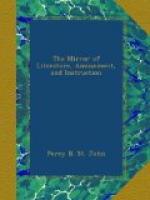The young champion of Berne had hanging along his back one of those huge two-handed swords, the blade of which measured five feet, and which were wielded with both hands. These were almost universally used by the Swiss; for, besides the impression which such weapons were calculated to make upon the array of the German men-at-arms, whose armour was impenetrable to lighter swords, they were also well calculated to defend mountain passes, where the great bodily strength and agility of those who bore them, enabled the combatants, in spite of their weight and length, to use them with much address and effect. One of these gigantic swords hung around Rudolf Donnerhugel’s neck, the point rattling against his heel, and the handle extending itself over his left shoulder considerably above his head. He carried another in his hand.
“Thou art punctual,” he called out to Arthur Philipson, in a voice which was distinctly heard above the roar of the waterfall, which it seemed to rival in sullen force. “But I judged thou wouldst come without a two-handed sword. There is my kinsman Ernest’s,” he said, throwing on the ground the weapon which he carried, with the hilt towards the young Englishman. “Look, stranger, that thou disgrace it not, for my kinsman will never forgive me if thou dost. Or thou mayst have mine if thou likest it better.”
The Englishman looked at the weapon, with some surprise, to the use of which he was totally unaccustomed.
“The challenger,” he said, “in all countries where honour is known, accepts the arms of the challenged.”
“He who fights on a Swiss mountain, fights with a Swiss brand,” answered Rudolf. “Think you our hands are made to handle penknives?”
“Nor are ours made to wield scythes,” said Arthur; and muttered betwixt his teeth, as he looked at the sword, which the Swiss continued to offer him—“Usum non habeo, I have not proved the weapon.”
“Do you repent the bargain you have made?” said the Swiss; “if so, cry craven, and return in safety. Speak plainly, instead of prattling Latin like a clerk or a shaven monk.”
“No, proud man,” replied the Englishman, “I ask thee no forbearance. I thought but of a combat between a shepherd and a giant, in which God gave the victory to him who had worse odds of weapons than falls to my lot to-day. I will fight as I stand; my own good sword shall serve my need now, as it has done before.”
“Content!—But blame not me who offered thee equality of weapons,” said the mountaineer. “And now hear me. This is a fight for life or death—yon waterfall sounds the alarum for our conflict.—Yes, old bellower,” he continued, looking back, “it is long since thou hast heard the noise of battle;—and look at it ere we begin, stranger, for if you fall, I will commit your body to its waters.”
“And if thou fallest, proud Swiss,” answered Arthur, “as well I trust thy presumption leads to destruction, I will have thee buried in the church at Einsiedlen, where the priests shall sing masses for thy soul—thy two-handed sword shall be displayed above the grave, and a scroll shall tell the passenger, Here lies a bear’s cub of Berne, slain by Arthur the Englishman.”




